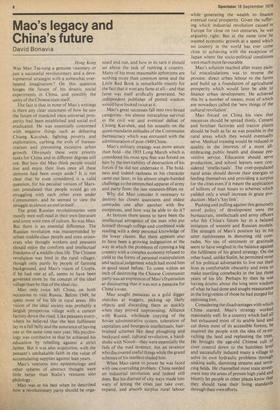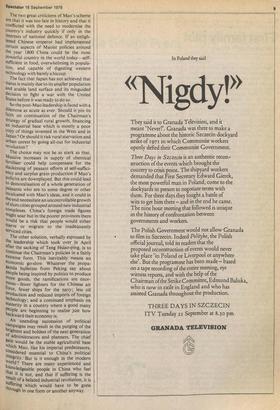Mao's legacy and China's future
David Bonavia
Hong Kong Was Mao Tse-tung a genuine visionary or just a successful revolutionary and a developmental strategist with a soniewhat overheated imagination? On this question hinges the future of his drastic social experiments in China, and possibly the unity of the Chinese state itself.
The fact is that in none of Mao's writings is there any clear statement of how he saw the future of mankind once universal prosperity had been established and social evil eradicated. He was essentially concerned with negative things such as defeating Chiang Kai-shek, fighting poverty and exploitation, curbing the evils of bureaucratism and preventing excessive urban growth. Obviously these were priority tasks for China and in different degrees still are. But how did Mao think people would live and enjoy their lives once all these demons had been swept aside ? It is not clear that he even considered it a valid question, for his peculiar version of Marxism postulated that people would go on struggling with each other even under Communism, and he seemed to view the struggle as almost an end in itself.
The great Russian revolutionaries were mostly men well-read in their own literature and some were men of culture. So was Mao. But there is an essential difference. The Russian revolution was masterminded by urban middle-class people and even aristocrats who thought workers and peasants should enjoy the comforts and intellectual freedoms of a middle-class life. The Chinese revolution was bred in the rural villages,' though only partly by people of farming background, and Mao's vision of Utopia, if he had one at all, seems to have been governed more by the concept of the ideal village than by that of the ideal city.
Mao only twice left China, on both occasions to visit Russia. Before 1949, he spent most of his life in rural areas. His vision of the ideal society was probably a largish prosperous village with a cement factory down the road. Like peasants every-. where he believed that the best fulfilment lay in a foil belly and the assurance of having one at the same time next year. His psychology was combative in that he achieved his education by rebelling against a strict father. But it was also acquisitive, with the peasant's unshakable faith in the value of accumulating supplies against lean years.
Mao's ventures into epistemology and other spheres of abstract thought were little better than Stalin's ventures into philology.
Mao was at his best when he described how a revolutionary party should be orga
nised and run, and how in its turn it should set about the task of running a country. Many of his most reasonable aphorisms are nothing more than common sense and the Little Red Book is remarkable mainly for the fact that it won any fame at all—and that fame was itself artifically generated. No independent publisher of potted wisdom would have looked twice at it.
Mao's great successes fall into two broad categories—his almost miraculous survival in the civil war and eventual defeat of Chiang Kai-shek, and his assaults on the quasi-mandarin attitudes of the Communist bureaucracy which was entrusted with the administration of post-1949 China.
Mao's military strategy was more astute than bold—the 1935 Long March which is considered his most epic feat was forced on him by the inevitability of destruction of his forces if he did not undertake it. The boldness and indeed rashness in his character came out later, in his almost single-handed challenge to the entrenched apparat of army and party from the late nineteen-fifties on.
Why did Mao consider it necessary to destroy his closest associates and oldest comrades one after another with few exceptions, and how was he able to do it?
At bottom there seems to have been the intellectual arrogance of the man who put himself through college and combined wide reading with a deep personal knowledge of the lower classes. But there appears also to have been a growing indignation at the way in which the problems of running a big country with a complex economy refused to yield to the forms of personal manipulation and tactical judgement which had stood him in good stead before. To come within an inch of destroying the Chinese Communist party was an expression of Mao's frustration at discovering that it was not a panacea for China's woes.
Mao sought panaceas as a gold digger snatches at nuggets, picking up likely objects and discarding them as quickly when they proved unpromising. Alliance with Russia, wholesale copying of the Soviet administrative system, toleration of capitalists and bourgeois intellectuals, hairbrained schemes like deep ploughing and backyard steel, cultural revolution, a handshake with Nixon—they were essentially the fads of the mad inventor, but an inventor who discovered useful things while the grand schemes of his intellect eluded him.
When Mao came to power he was faced with one overriding problem: China needed an industrial revolution and indeed still does. But his distrust of city ways made him wary of letting the cities just take over, expand, and absorb surplus rural labour while generating the wealth to finance eventual rural prosperity. Given the suffering which industrial revolution caused in Europe for close on two centuries, he was arguably right. But at the same time he wanted economic growth at a speed w(lich no country in the world has ever come close to achieving with the exception of Japan where the socio-political conditions were much more favourable.
Mao's solution reached after many painful miscalculations was to reverse the process: direct urban labour to the farms and build up a foundation of agricultural prosperity which would later be able to finance urban development. He achieved this by a number of means, most of which are nowadays called the new things of the cultural revolution'.
, Mao forced on China his view that resources should be spread thinly. Cement and fertiliser factories and tractor plants should be built as far as was possible in the rural areas which they would eventually serve. Medical training would be reduced in quality in the interests of a more allembracing public health and disease preventive service. Education should serve production, and school leavers were considered 'intellectuals'. The over-populated rural areas should devote their energies to feeding themselves and providing a surplus for the cities even if it meant the application of billions of man hours to schemes which yielded only a small increase in grain production: MaO's 'key link'.
Pushing and pulling against this genuinely novel , policy of development were the bureaucrats, intellectuals and army officers who felt China's future lay in a belated imitation of western and Russian models. The strength of Mao's position lay in his utter ruthlessness in demoting old comrades. No ties of sentiment or gratitude seem to have weighed in the balance against the fulfilment of his grand strategy. On the other hand, unlike Stalin, he permitted most of his political adversaries to live out their lives in comfortable obscurity and even to make startling comebacks in the last three years of his life. Perhaps by then he was having doubts about the long term wisdom of what he had done and sought reassurance in the forgiveness of those he had purged for opposing him. Considering the disadvantages with which China started, Mao's strategy worked reasonably well. In a country which had all but exhausted most of its arable land and cut down most of its accessible forests, he inspired the people with the idea of re-enriching the land and replanting the trees. He brought the age-old Chinese cult of river control down to the humblest level and successfully induced many a village to solve its own hydraulic problems through sinking wells, damming streams and terracing fields. He channelled most state investment into the areas of proven high yield and bluntly let people in other places know that they should raise their living standards through their own efforts.
The two great criticisms of Mao's scheme are that it was too late in history and that it conflicted with the need to modernise the country's industry quickly if only in the interests of national defence. If an enlightened Chinese emperor had implemented certain aspects of Maoist policies around the year 1800 China could be the most Powerful country in the world today—selfsufficient in food, overwhelming in population, and capable of digesting western technology with barely a hiccup.
The fact that Japan has not achieved that status is mainly due to its smaller population and arable land surface and its misguided decision to fight a war with the United States before it was ready to do so.
So the post-Mao leadership is faced with a dilemma as acute as ever. Should it pin its faith on continuation of the Chairman's strategy of gradual rural growth, financing an industrial base which is mostly a poor copy of things invented in the West and in Japan ?Or should it risk rural starvation and Urban unrest by going all-out for industrial revolution ?
The choice may not be as stark as that. Massive increases in supply of chemical fertiliser could help compensate for the Slackening of peasant efforts at self-sufficiency and surplus grain production if Mao's Policies are downplayed. But this could lead to demoralisation of a whole generation of Peasants who are to some degree or other inculcated with Mao's ideas, and it could in the end necessitate an uncontrollable growth of slum cities grouped around new industrial complexes. China's foreign trade figures 'night soar but in the poorer provinces there Would be a risk that people would either starve or migrate to the inadequately serviced cities.
The other solution, verbally espoused by the leadership which took over in April after the sacking of Teng Hsiao-ping, is to continue the Chairman's policies in a fairly extreme form. This inevitably means an economic go-slow. Whatever the propaganda bulletins from Peking say about People being inspired by politics to produce more goods, the ramifications are enorIndus—fewer fighters for the Chinese air force, fewer ships for the navy; less oil Production and reduced impOrts of foreign technology ; and a continued emphasis on austerity in a country where a good many .1)eoPle are beginning to realise just how nackward their economy is.
An unending succession of political
Campaigns may result in the purging of the brightest and boldest of the next generation
of administrators and planners. The chief gain would be the stable agricultural base Which Mao, like his imperial predecessors,
Considered essential to China's political integrity. But is it enough in the modern
world? There are many experienced and
Knowledgeable people in China who feel that it is not, and that if suffering is the result of a belated industrial revolution, it is suffering which would have to be gone through in one form or another anyway.






































 Previous page
Previous page